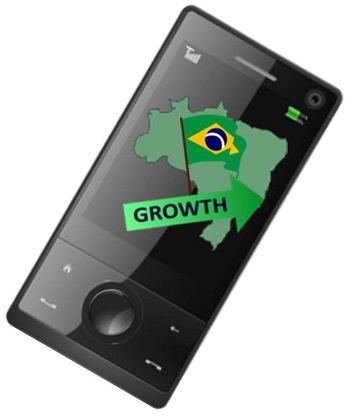Sales almost doubled over the holiday shopping season in 2014, when compared to the year before.
According to E-bit, a Brazilian e-commerce consultancy, sales that were made over mobile commerce in the country, during the Christmas shopping season, almost doubled in 2014 when compared to the figures that were produced during that same span of time in 2013.
From November 15 through December 24, there was an increase of 96 percent in m-commerce purchases.
The purchases made over mobile commerce represented 8.8 percent of the total online sales that were experienced in the country. Comparatively, in 2013, smartphone and tablet based shopping made up only 4.5 percent of the total online sales, during the same period of time. When it came to revenue, m-commerce also made up 8.8 percent of the total during the holiday shopping period. This represented an increase of 82 percent over the figure generated by the firm in 2013.
A considerable part of the growth in Brazil’s mobile commerce figures were the result of Black Friday’s sales.
 E-bit reported that on that one day alone, there was a growth of 609 percent over m-commerce, when compared to Black Friday in 2013. The director of the firm, Pedro Guasti, said that “The share of mobile devices in virtual shopping is already nearing 9%. New entrants – those with no Internet access, as well as those with access from computers – are now migrating to smartphones and tablets”
E-bit reported that on that one day alone, there was a growth of 609 percent over m-commerce, when compared to Black Friday in 2013. The director of the firm, Pedro Guasti, said that “The share of mobile devices in virtual shopping is already nearing 9%. New entrants – those with no Internet access, as well as those with access from computers – are now migrating to smartphones and tablets”
Among the main drivers of the use of mobile devices for shopping purposes has been their rapid and growing penetration throughout the country. As more consumers own smartphones and tablets, it has caused the amount of marketing and selling targeting consumers using those gadgets to rise considerably. This was made clear, recently, by the panel at the São Paulo based Mobile+ Forum.
Equally, the instability of the broadband connections in Brazil have the potential to frustrate possible customers and have, according to the forum’s panelists, led shoppers to abandon their shopping carts before their transactions are complete. This will clearly be an important hurdle for mobile commerce to overcome if it is to continue it staggering growth rate in the country.
Retailers are reporting promising results from the holiday shopping weekend
The most significant retail holiday in the United States, Black Friday, has come and gone and many retailers saw a spike in total sales thanks to mobile commerce. Wal-Mart reported that it experienced the best three-day online shopping period it has seen in recent history and the company’s experience is being echoed by others that have adopted a focus on the digital space. According to a report from comScore, e-commerce sales throughout the United States surpassed $1 billion for the first time.
Total retail sales are lower this year than they were in 2013
While more people are shopping online, especially from their mobile devices, the retail sector has encountered some turbulence this year. Total retail sales for the holiday shopping weekend were down this year when compared to the results of 2013, according to the National Retail Federation. Many consumers opted to avoid physical stores in favor of mobile and e-commerce, while others opted to avoid holiday shopping altogether. The exact reasons behind lower retail sales this year and not entirely clear.
E-commerce is thriving among consumers interested in convenient shopping solutions
 The report from comScore notes that consumers are shopping more from their personal computers and mobile devices. The report shows that shopping from a PC increased by 32% on Thanksgiving Day and 26% on Black Friday. Throughout November, purchases made from desktop computers rose by 15%. The report suggests that mobile commerce accounted for approximately 2% of all digital sales made during the holiday shopping weekend.
The report from comScore notes that consumers are shopping more from their personal computers and mobile devices. The report shows that shopping from a PC increased by 32% on Thanksgiving Day and 26% on Black Friday. Throughout November, purchases made from desktop computers rose by 15%. The report suggests that mobile commerce accounted for approximately 2% of all digital sales made during the holiday shopping weekend.
Mobile commerce has helped some retailers find success
The report also shows that e-commerce spending reached $1.009 billion this year, higher than the $766 million reported last year. Shopping online has become quite popular among consumers because of the convenience that it offers. When shopping at home from a computer, consumers can avoid the chaotic crowds that flock to retail stores on Black Friday. This convenience can also be found through mobile commerce, which allows people to purchase the products they are interested in at any time, no matter where they may be.
 E-bit reported that on that one day alone, there was a growth of 609 percent over m-commerce, when compared to Black Friday in 2013. The director of the firm, Pedro Guasti, said that “The share of mobile devices in virtual shopping is already nearing 9%. New entrants – those with no Internet access, as well as those with access from computers – are now migrating to smartphones and tablets”
E-bit reported that on that one day alone, there was a growth of 609 percent over m-commerce, when compared to Black Friday in 2013. The director of the firm, Pedro Guasti, said that “The share of mobile devices in virtual shopping is already nearing 9%. New entrants – those with no Internet access, as well as those with access from computers – are now migrating to smartphones and tablets”
 The report from comScore notes that consumers are shopping more from their personal computers and mobile devices. The report shows that shopping from a PC increased by 32% on Thanksgiving Day and 26% on Black Friday. Throughout November, purchases made from desktop computers rose by 15%. The report suggests that mobile commerce accounted for approximately 2% of all digital sales made during the holiday shopping weekend.
The report from comScore notes that consumers are shopping more from their personal computers and mobile devices. The report shows that shopping from a PC increased by 32% on Thanksgiving Day and 26% on Black Friday. Throughout November, purchases made from desktop computers rose by 15%. The report suggests that mobile commerce accounted for approximately 2% of all digital sales made during the holiday shopping weekend.